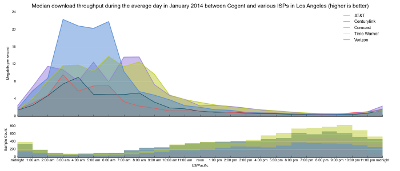Monitoring Interconnection Performance Since the Open Internet Order
Introduction
As a platform committed to producing empirical data for the public, Measurement Lab (M-Lab) has historically supplied regulators and other governmental entities with technical facts pertinent rule-making processes. In our February 2015 submission to the FCC’s Open Internet docket, we committed to research on the state of broadband and performance impact of interconnection in the United States. Earlier this year, the FCC began the process of re-evaluating its authority over broadband Internet services, and opened a Notice of Proposed Rulemaking. This blogpost is a shortened version comments that M-Lab filed in the docket regarding its continued research on the impact of interconnection on consumer broadband. The full filing in the FCC docket includes an elaboration of our research with additional supporting evidence and charts.
New Opportunities for Test Deployment and Continued Analysis of Interconnection Performance
In late April, Internet2, with contributions from M-Lab developers, released an updated version of the Network Diagnostic Tool (NDT), M-Lab’s most widely deployed performance measurement test. In addition to improved stability, the updated version of NDT makes it possible to measure network performance from a web browser without the need for browser plugins. This change removes a layer of complexity and hassle for developers and users. Anyone interested in Internet measurement can now create their own NDT client targeted for specific user populations, regions, and research objectives, using only HTML and Javascript.
Internet Observatory Updates and Improvements
Last October, Measurement Lab released the Internet Observatory, a data-visualization tool that enables consumers, policymakers, and researchers to better understand the impact of ISP relationships on Internet access and performance. The Observatory provides easier access to M-Lab’s rich dataset on network performance to reproduce the analysis in our report on “ISP Interconnection and its Impact on Consumer Internet Performance.”
M-Lab at RIPE
 On Thursday Nov. 6, Collin Anderson gave a talk at the RIPE meeting in London. Collin has been immersed in the M-Lab data for some time, and helped lead the recently published technical report, ISP Interconnection and its Impact on Consumer Internet Performance. He presented a lyrical overview of these research findings for the assembled crowd of network operators and researchers, which is archived on the RIPE website.
On Thursday Nov. 6, Collin Anderson gave a talk at the RIPE meeting in London. Collin has been immersed in the M-Lab data for some time, and helped lead the recently published technical report, ISP Interconnection and its Impact on Consumer Internet Performance. He presented a lyrical overview of these research findings for the assembled crowd of network operators and researchers, which is archived on the RIPE website.
Research Updates: Beginning to Observe Network Management Practices as a Third Party
Prior to the publication of our recent report, ISP Interconnection and its Impact on Consumer Internet Performance, we shared review copies with members of the research community, broadening the set of eyes on our methods and challenging our assertions. We received valuable feedback that allowed us to improve what we published, along with a list of research questions that we will be exploring and documenting over the coming months in our Research Updates series of blog posts adding insights to Research Reports.
ISP Interconnection and its Impact on Consumer Internet Performance: Introducing A New M-Lab Consortium Technical Report
 We are happy to announce the release of a long-term collaborative research effort using M-Lab’s data to understand how interconnection impacts end-user performance. The report, ISP Interconnection and its Impact on Consumer Internet Performance examines years of network measurement data from across the United States to determine the effects of network interconnection on the Internet performance of customers subscribing to specific access ISPs. Alongside this report, we are also pleased to release the Internet Observatory – a dynamic data visualization tool that will allow consumers, policymakers, and researchers to better understand the impact of ISP relationships on their own Internet access and performance. The Internet Observatory will be updated regularly, allowing future monitoring and comparison against past performance.
We are happy to announce the release of a long-term collaborative research effort using M-Lab’s data to understand how interconnection impacts end-user performance. The report, ISP Interconnection and its Impact on Consumer Internet Performance examines years of network measurement data from across the United States to determine the effects of network interconnection on the Internet performance of customers subscribing to specific access ISPs. Alongside this report, we are also pleased to release the Internet Observatory – a dynamic data visualization tool that will allow consumers, policymakers, and researchers to better understand the impact of ISP relationships on their own Internet access and performance. The Internet Observatory will be updated regularly, allowing future monitoring and comparison against past performance.